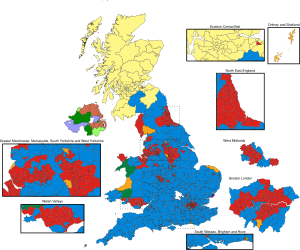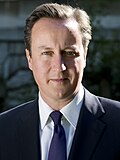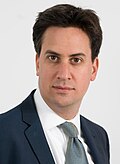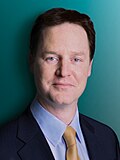| |||||||||||||||||||||||||||||||||||||||||||||||||||||||||||||||||||||||||||||
All 650 seats in the House of Commons[1] 326 seats needed for a majority | |||||||||||||||||||||||||||||||||||||||||||||||||||||||||||||||||||||||||||||
|---|---|---|---|---|---|---|---|---|---|---|---|---|---|---|---|---|---|---|---|---|---|---|---|---|---|---|---|---|---|---|---|---|---|---|---|---|---|---|---|---|---|---|---|---|---|---|---|---|---|---|---|---|---|---|---|---|---|---|---|---|---|---|---|---|---|---|---|---|---|---|---|---|---|---|---|---|---|
| Opinion polls | |||||||||||||||||||||||||||||||||||||||||||||||||||||||||||||||||||||||||||||
| Registered | 46,354,197 | ||||||||||||||||||||||||||||||||||||||||||||||||||||||||||||||||||||||||||||
| Turnout | 30,697,525 66.4%[2] ( | ||||||||||||||||||||||||||||||||||||||||||||||||||||||||||||||||||||||||||||
| |||||||||||||||||||||||||||||||||||||||||||||||||||||||||||||||||||||||||||||
 Colours denote the winning party, as shown in the main table of results. † Figure does not include the Speaker of the House of Commons John Bercow, who was included in the Conservative seat total by some media outlets. | |||||||||||||||||||||||||||||||||||||||||||||||||||||||||||||||||||||||||||||
 Composition of the House of Commons after the election | |||||||||||||||||||||||||||||||||||||||||||||||||||||||||||||||||||||||||||||
| |||||||||||||||||||||||||||||||||||||||||||||||||||||||||||||||||||||||||||||
The 2015 United Kingdom general election was held on Thursday, 7 May 2015 to elect 650 members of Parliament (MPs) to the House of Commons. The Conservative Party, led by prime minister David Cameron, won a unexpected majority victory of ten seats; they had been leading a coalition government with the Liberal Democrats. It was the last general election to be held before the UK voted to leave the European Union (EU) in June 2016.
Opinion polls and political commentators had wildly predicted that the election would result in a second consecutive hung parliament whose composition would be similar to the one elected at the previous general election in 2010. Potential coalitions and agreements between parties were intensively discussed; as a result, smaller parties received much more attention during the campaign than in previous UK elections. However, opinion polls underestimated the Conservatives, as they won 330 of the 650 seats and 36.9 per cent of the vote, giving them a small overall majority.
The opposition Labour Party, led by Ed Miliband, saw a small increase in its share of the vote to 30.4 per cent, but it won 26 fewer seats than in 2010, giving them 232 MPs. This was the fewest seats the party had won since the 1987 general election, when it had 229 MPs returned. Labour lost significant ground in Scotland to the Scottish National Party (SNP) who enjoyed a huge surge, winning 56 of the 59 Scottish seats, becoming the third-largest party in the House of Commons and the largest party in Scotland, knocking Labour from the status which it had held since 1964.
The Liberal Democrats, junior coalition partners led by Deputy Prime Minister Nick Clegg, suffered heavy losses, losing 49 of their 57 seats. Returning just eight MPs, it was their worst result since their formation in 1988. Cabinet ministers Vince Cable, Ed Davey, and Danny Alexander lost their seats, whilst Clegg only narrowly held his own seat. The UK Independence Party (UKIP) received 12.6 per cent of the vote, displacing the Liberal Democrats as the third-placed party in terms of popular vote, but won only one seat: Clacton, which they had gained at a by-election six months earlier. They failed to retain their other seat gained in a by-election, Rochester and Strood, and the party's leader, Nigel Farage, ran in South Thanet but narrowly fell short of winning the seat. The Green Party of England and Wales won its highest ever vote share of 3.8 per cent, and their only MP, Caroline Lucas, retained her seat, Brighton Pavilion.[3]
In Northern Ireland, the Democratic Unionist Party remained the largest party, the Ulster Unionist Party returned to the Commons with two seats after a five-year absence, and the Alliance Party lost its only seat of Belfast East, represented by Naomi Long for the party, despite an increase in their vote share.
Following the election, Miliband and Clegg resigned their leaderships. Jeremy Corbyn succeeded Miliband as Leader of the Labour Party, while Tim Farron succeeded Clegg as Leader of the Liberal Democrats.
Despite speculation before the election that it would herald a new era of multi-party politics in the UK, it ended-up being the antithesis, marking a return to traditional two-party politics seen throughout the second half of the 20th century; Conservative–Labour domination would continue until the 2024 election. The SNP began a nine-year domination of Scottish Westminster seats. Charles Kennedy, who served as the leader of the Liberal Democrats from 1999 to 2006, made his last public appearance during the election campaign, in which he lost his seat; he died on 1 June 2015.
Notable MPs who retired at this election included former prime minister and Labour leader Gordon Brown, former Chancellor of the Exchequer Alistair Darling, former leader of the opposition and Conservative leader William Hague, and former leader of the Liberal Democrats Menzies Campbell. Notable newcomers to the House of Commons included future prime minister and Labour leader Keir Starmer; future prime minister, Conservative leader and Chancellor of the Exchequer Rishi Sunak, who also succeeded Hague as MP for Richmond (Yorks); future deputy prime minister and deputy Labour leader Angela Rayner and future SNP Commons leader Ian Blackford. Another future prime minister and Conservative leader, Boris Johnson, who had previously left Parliament in 2008 so he could serve as the mayor of London, returned to Parliament as MP for Uxbridge and South Ruislip.
It was the first of three general elections to be held under the rules of the Fixed-term Parliaments Act 2011. Local elections took place in most areas of England on the same day and is to date the most recent general election to coincide with local elections.
- ^ UK 2015 general election results in full The Guardian (retrieved 5 May 2024)
- ^ "The May 2015 UK elections: Report on the administration of the 7 May 2015 elections, including the UK Parliamentary general election" (PDF). p. 3. Archived (PDF) from the original on 22 February 2017. Retrieved 15 May 2016.
- ^ Bawden, Tom (8 May 2015). "A victorious Caroline Lucas has perfectly summed up how negative our politics is". The Independent. Archived from the original on 19 December 2019. Retrieved 9 May 2015.
Cite error: There are <ref group=n> tags on this page, but the references will not show without a {{reflist|group=n}} template (see the help page).



